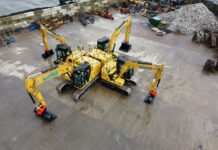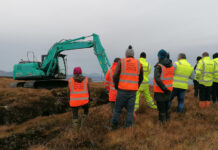
THE Scottish Plant Owners Association (SPOA) has compiled its formal response to the UK Government’s consultation on plans to remove the subsidy on red diesel.
Signed by SPOA president Mark Anderson, the document represents the collective response from the organisation’s 260 members.
The SPOA revealed that while members are fully behind the policy aims to create lower carbon emissions, a seven year timeframe is required to allow the life cycle of machinery to end and for equipment manufacturers to have the necessary green products in place.
“The hire industry by its very nature is part of the circular economy whereby we allow lots of people to use our machines, thus stopping the necessity for everyone to own one, resulting in the hire industry having a positive impact on the environment,” the response states. “At the end of machine life, we then sell to other countries and the process starts again. This simple fact should result in the hire industry being an exempt industry and allowed to continue with the red diesel subsidy with a seven year timeline before the subsidy is removed.”
In response to the consultation question regarding whether removing the entitlement to use red diesel will create ‘perverse’ environmental outcomes, the SPOA said, “Our members invest heavily in equipment and Tier 5 engines are already dramatically more efficient than those used in the car industry. A perverse environmental outcome is that our members are likely to continue to use older, more inefficient machinery for longer than otherwise expected (1) to mitigate the costs of the removal of the rebate and (2) because new investment for a shorter life cycle than seven years (assuming green alternatives become available) is not viable.
“In the short term the removal of red diesel subsidy will neither create nor reduce the environmental impact in our industry. Typically hire companies run their equipment for between five and seven years, the very nature of our industry is we hire out used equipment, thus a two year period before the subsidy removal will not allow sufficient time to bring in alternative fuel machines. Furthermore, OEMs will not be in a place to offer a wide enough range of machinery within this time period.”
A further question concerned the impact removing the entitlement to use red diesel would have on the price of goods and services households and/or voluntary organisations use or pay for over the long-term.
The SPOA revealed that households and voluntary organisations are frequently customers of its members, with not all construction projects being on a commercial scale.
The organisation added that removal of the red diesel subsidy will mean an increase in three ways: where machinery is hired with an operator the hourly rate will increase by the same amount the red diesel subsidy represented; where machinery is hired without an operator the fuel top up charge at the end of the hire will be charged at the rate plus overheads of white diesel; and where machinery is used in quarrying the cost per tonne of materials will increase by the same amount the red diesel subsidy represents.
The SPOA said its records indicate that the plant hire industry in Scotland’s red diesel consumption is £95 million per annum and this figure is 100% attributable to hired out machinery.
“The hire revenue turnover of the Scottish hire industry is circa £1bn per annum, and, from our records, currently 99.7% of this revenue is from machines which operate on red diesel,” the SPOA said. “The total Gross Book Value (GBV) of equipment the SPOA members own is £2.5bn or circa 100,000 individual items of plant.”
In terms of operational and financial capacity to shift to alternatives to red diesel, the SPOA stated, “Currently OEMs have introduced alternative powered machines (battery and hydrogen) up to 3T machines – this represents only 7% of the machinery hired out in the Scottish plant hire industry if we got 100% compliance.
“Alternative powered machines are typically three times as expensive as the diesel engine equivalents. We do not yet know the residual value of generation one alternative powered machines; typically the first generation of any product is lower than expected.
“Furthermore (1) the utilisation of alternative powered machines is and will not be as high as diesel machines due to the limitation of the technology, and (2) if the rest of the world is still using diesel machines the residual value of alternative powered machines will reduce due to the limited market for re-sale.”
With reduced residual values for diesel machines, the SPOA suggested the Government should consider a scrappage scheme for the plant industry to encourage the move to alternative powered machines.
With many SPOA members operating on slim margins, the organisation said it foresees 100% of the subsidy removal being passed on, while hire rates would also increase.
The SPOA also expressed concerns over the intention to maintain the entitlement to use red diesel for agriculture, rail and for non-commercial heating, stating that 62 of its 260 members are involved in agriculture and machinery hire. The SPOA said those firm will gain an ‘unfair competitive advantage’ when tendering for work as their overheads will be lower.
In response to the consultation question about the Government’s suggested approach to compliance, the SPOA said it is ‘only theoretically proportionate and appropriate’.
“It assumes the issue is about purchase of red diesel after April 2022 but ignores what happens to red diesel that is already in the tank on that date,” the response stated. “Our members won’t drain the tank, lines or injectors but will just continually top up with white diesel so there could be residue in the machine for up to 12 months. Seizure of machines albeit with the right to then satisfy compliance officers is an excessive remedy in that first 12 months period.”
The SPOA went on to highlight that white diesel is more attractive to steal than red diesel, resulting in the need for added security on construction sites to deter fuel thieves.
“The increased attraction of fuel theft also puts at risk the security of the equipment stored on the site,” the SPOA added. “Our members can anticipate their insurance costs increasing.
“The increase in theft will also present a risk to human life as not all people stealing fuel will do this safely and the removal and transportation could lead to unintended consequences including environment spills and potential loss of life if removed or transported incorrectly.”








